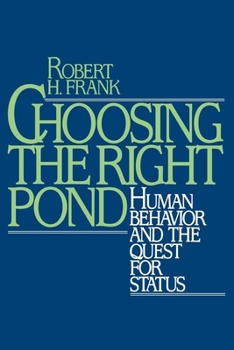Choosing the Right Pond: Human Behavior and the Quest for Status
Select Format
Select Condition 
Book Overview
Is it better to be a big frog in a small pond or a small frog in a big pond? Here, economist Robert H. Frank argues that concerns about status permeate and profoundly alter a broad range of human behavior. He shows how status considerations affect the salaries people earn, the way they spend them, and even many of the laws, regulations, and cultural norms they adopt. Provocative and insightful, this book is sure to spark widespread and lively debate...
Format:Paperback
Language:English
ISBN:0195049454
ISBN13:9780195049459
Release Date:February 1987
Publisher:Oxford University Press, USA
Length:299 Pages
Weight:1.00 lbs.
Dimensions:0.8" x 6.2" x 9.3"
Customer Reviews
2 ratings
A Primary Source in Evolutionary Psychology
Published by Thriftbooks.com User , 19 years ago
Frank offers empirical evidence that people organize themselves into status hierarchies - that high status is an advantage and low status is a hardship. The animal kingdom at large does this, too, and that explains why this book is found in the bibliographies of books like Robert Wright's "The Moral Animal: Why We Are the Way We Are: The New Science of Evolutionary Psychology" and Stephen Pinker's "The Blank Slate: The Modern Denial of Human Nature." In the emerging hybrid field of Evolutionary Psychology, Frank's contributions on status are significant. The value of having hierarchical status finds reinforcement in the study of sexual selection of the highly social mammals, including humans. Frank anticipates this link between Economics and Evolutionary Psychology by referring to a study done that found a positive correlation between serotonin levels and status in both a heirarchy of chimpanzees as well as a group of college fraternity members. Frank's work here will only grow in importance as Evolutionary Psycology and similar hybrid sciences continue to gain momentum.
Nothing Fishy Here!
Published by Thriftbooks.com User , 22 years ago
Robert Frank's book "Choosing the Right Pond" is a thought provoking book that offers significant explanatory power to behaviors that we see every day. Utilizing the author's economics background, but ably drawing on the fields of psychology and public policy, this book is an enjoyable read. The concepts presented within easily lend themselves to other circumstances not discussed by the author. While the demarcation is not explicit, chapters 1-8 are applied more toward interpersonal issues of status, whereas chapters 9-12 have more to do with how status is applied on a policy or societal level. The first chapter covers who we choose to compare ourselves to and the more obvious cues we use to identify standing. The second chapter looks at the impacts that biology and proximity has upon the value we give to status. The third chapter uses income and productivity to discuss observed status behaviors and collective agreements to minimize competition in the workplace. Chapters four and five discuss the impact of proximity between status seekers to explain the disparity of incomes within the same pool of individuals. Chapter six discusses fairness within the system of progressive taxation and why the wealthy are generally willing to shoulder a disproportionate burden of payment. Chapter seven discusses how when one individual's attempt to obtain advantage are imitated by others, the advantage disappears and everyone's relative position is the same as before. Chapter eight covers how people allocate their incomes when seeking status. Of particular interest to me was the discussion on savings. While the life cycle hypothesis, permanent income hypothesis, precautionary saving model, etc., all play roles in savings behavior, in my own explorations, I have come across very little that attempts to account for the impact of status seeking on savings, or the lack thereof. I was particularly intrigued with the author's discussion on the lack of visibility of savings (as opposed to obvious things like a large house or fancy car) reducing it's ability to connote status as yet another explanatory factor in household behavior. The remaining chapters, while I'm sure they will be of interest to some, were of a larger perspective than is of importance to me. I found "Choosing the Right Pond" to be an engaging book that has resulted in significant discussion between my co-workers and myself. Many of the concepts found in this book are explored further in the author's later book, "Luxury Fever." "Choosing the Right Pond" offers much to anyone who enjoys understanding the role they and others play in our daily games of interpersonal status.





